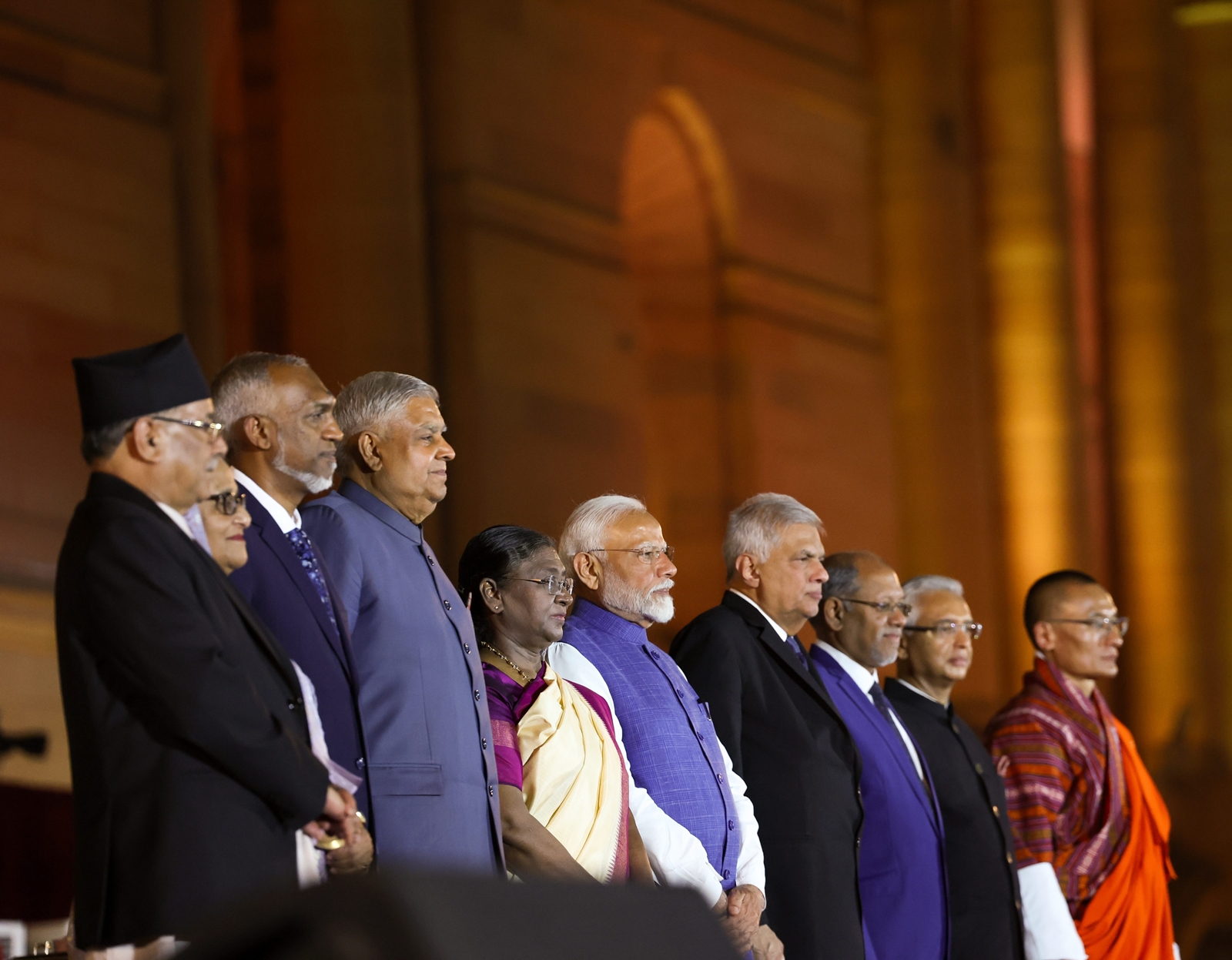The Indian general elections have captured global attention — but perhaps none are more intently watching than its immediate neighbours. As a rising regional economic powerhouse on the cusp of becoming the world’s third-largest economy, India’s political trajectory profoundly impacts South Asia’s stability, security, and prosperity. The high stakes have sparked diverse reactions and perspectives across the neighbourhood. The BJP-led NDA securing a third consecutive term has ignited speculation from Dhaka to Islamabad, from Kathmandu to Colombo. Nations sharing borders and ties with India are closely scrutinising the poll results, seeking to decipher the ramifications of their relationships with the regional powerhouse.
For Dhaka, the BJP’s electoral victory has evoked a mix of optimism and apprehension. The continuity in leadership could facilitate progress in ongoing initiatives that have seen bilateral trade grow threefold from around $5.3 billion in 2012-13 to over $15.9 billion in 2022-23. India is also a major investor in Bangladesh, with investments exceeding $3 billion across sectors like energy, telecommunications and manufacturing. Overcoming territorial issues like the Land Border Agreement of 2015 has been a positive development.
However, certain longstanding issues pose potential challenges. The protracted Teesta water-sharing dispute, which began in 1983, has taken an interesting turn with China being awarded a contract for a comprehensive river management project. India’s subsequent but delayed interest in the project has placed Dhaka in a delicate position.
With its close political relations and deep socio-cultural and historical ties to India, Bangladesh has maintained a cautious stance on the Citizenship Amendment Act (CAA). Prime Minister Sheikh Hasina called the Act “unnecessary” and Bangladeshi foreign and home ministers cancelled visits to India after it was passed. Further, the BJP’s pledge to implement a Uniform Civil Code (UCC) has raised questions about its potential impact on Bangladeshis, given the shared cultural ties between the nations.

As Bangladesh manages its multifaceted relationship with India, it aims to judiciously balance cooperation while safeguarding its core interests. PM Hasina’s government has adeptly fostered close ties with both BJP and Congress, nurturing unprecedented growth of bilateral relationships. This was underscored by the fact that Bangladesh was the only neighbour to receive an invite to the G20 Leadership Summit last year under the Indian presidency.
What others are thinking
As expected, Pakistan’s reaction has been apprehensive, fearing the BJP’s hardline stance could complicate the Kashmir dispute and diminish prospects for dialogue. However, bilateral trade between India and Pakistan increased to $1.35 billion during April-December 2022, compared to $516.36 million in 2021-22, reflecting improved economic ties.
Nepal harbours concerns over India’s approach to regional cooperation, development assistance, and hydropower projects due to its heavy trade reliance on India worth over $13.59 billion in 2022-23. It faced fuel shortages due to blockades and diplomatic fallout with India during the 2015 crisis. That opened the door for China as India’s historical clout with its small landlocked neighbour started eroding. Things have never been the same.
While Bhutan’s relationship with India is expected to remain largely unaffected, Sri Lanka and Maldives are wary of India’s potential renewed push for regional influence in the strategically vital Indian Ocean region.
Connectivity and security
India’s goal of becoming the world’s third-largest economy by 2027 and a developed economy by 2047 when it celebrates its centenary anniversary hinges on deepening economic engagement with neighbours. Initiatives like the BIMSTEC (Bay of Bengal Initiative for Multi-Sectoral Technical and Economic Cooperation) and Bangladesh Bhutan India Nepal Motor Vehicles Agreement could facilitate cross-border movement of goods, services, and people and promote regional connectivity through infrastructure, energy cooperation, and people-to-people ties. The BIMSTEC Master Plan for Transport Connectivity identifies 167 projects worth $50 billion, aimed at enhancing regional integration. Areas of shared interest also include combating climate change, fostering sustainable development, and enhancing educational and cultural exchanges.
While opportunities for collaboration exist, India’s neighbours may face challenges engaging with the new government over concerns regarding domestic policies and historical grievances. The new government’s foreign policy approach will shape the regional security dynamics. Addressing factors behind border incidents and security concerns, smuggling and human trafficking, militarisation and radicalisation is vital for a long-term resolution. India’s economic influence and desire for a stable neighbourhood could drive cooperation in areas like counter-terrorism, maritime security, and combating transnational organised crime. Constructive dialogue and mutual understanding will be crucial in building trust and goodwill in the region.
An opportunity
The election results offer a pivotal opportunity for India to redefine South Asia’s trajectory towards harmony. The newly elected leaders must sensitively address neighbours’ concerns, reciprocated through collaboration. Prioritising people-ties, economic interdependence, and dialogue can pave the way for an integrated, secure future rooted in mutual respect and shared progress.
The path is challenging, but a thriving, harmonious region makes it worthwhile for India in its pursuit of leadership – both regionally and globally. Positive change via constructive engagement and sustained dialogue are the need of the hour in South Asia. This is a tall order though for a region historically more fractured than integrated.
The writer is chairman of the international think tank IPAG India, New Delhi with a presence in Dhaka, Melbourne, Dubai, and Vienna


